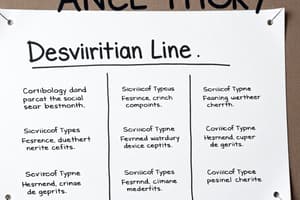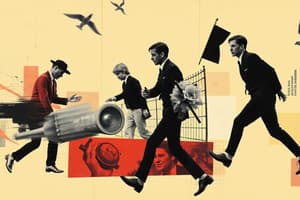Podcast
Questions and Answers
According to symbolic interactionist George Herbert Mead, the 'generalized other' is:
According to symbolic interactionist George Herbert Mead, the 'generalized other' is:
- The inability of very young children to differentiate between themselves and others.
- The guidelines and expectations associated with a particular role. (correct)
- An understanding of the rules governing a number of different players in related roles.
- Any agent of socialization who serves to teach an individual to become a member of a social group.
A student sitting through a boring class glances over at a friend and rolls her eyes. What would Erving Goffman call this?
A student sitting through a boring class glances over at a friend and rolls her eyes. What would Erving Goffman call this?
- None of them
- Region
- Back stage
- Front Stage (correct)
In order for a behavior, trait, or belief to be considered deviant, it must:
In order for a behavior, trait, or belief to be considered deviant, it must:
- Depart from a norm and generate a negative reaction. (correct)
- Cause harm or injury to someone.
- Break some social norm.
- Inspire feelings of revulsion or disgust.
Robert Merton developed a structural strain theory to explain why deviance happens. What sort of strain is he referring to?
Robert Merton developed a structural strain theory to explain why deviance happens. What sort of strain is he referring to?
Because laws represent the interests of those in power, typically crimes committed by the upper classes are treated more leniently than crimes committed by the lower classes. This argument is consistent with:
Because laws represent the interests of those in power, typically crimes committed by the upper classes are treated more leniently than crimes committed by the lower classes. This argument is consistent with:
Which kinds of departures from the norm can have a label which affects an individual's identity?
Which kinds of departures from the norm can have a label which affects an individual's identity?
According to Chapter 6, what sort of group dynamic may have led officials at NASA to ignore warnings and launch the space shuttle Challenger, which then exploded shortly after take-off?
According to Chapter 6, what sort of group dynamic may have led officials at NASA to ignore warnings and launch the space shuttle Challenger, which then exploded shortly after take-off?
Which of the following is an example of an altered life circumstance that will require some degree of resocialization?
Which of the following is an example of an altered life circumstance that will require some degree of resocialization?
What is the danger of too much group cohesion?
What is the danger of too much group cohesion?
Under what circumstances does a deviant move from primary to secondary deviance?
Under what circumstances does a deviant move from primary to secondary deviance?
Which of the following statements is NOT true about in-groups?
Which of the following statements is NOT true about in-groups?
The main components of race socialization are _____
The main components of race socialization are _____
According to George Herbert Mead, how does a child develop a social self?
According to George Herbert Mead, how does a child develop a social self?
How do the media contribute to gender role socialization?
How do the media contribute to gender role socialization?
What is the name of the theory for this statement: 'A child develops a social self by interacting and being surrounded by people.'
What is the name of the theory for this statement: 'A child develops a social self by interacting and being surrounded by people.'
One of them is NOT a stage of the life course:
One of them is NOT a stage of the life course:
One of them is NOT a theoretical framework to describe the nature of aging in U.S. society?
One of them is NOT a theoretical framework to describe the nature of aging in U.S. society?
Functionalist theory sees social life as competition and focuses on distribution of resources, power, and inequality. It is true, because _____
Functionalist theory sees social life as competition and focuses on distribution of resources, power, and inequality. It is true, because _____
One of 'clocks' is not for the meanings of 'age.'
One of 'clocks' is not for the meanings of 'age.'
What is the macro level of structural functional study below?
What is the macro level of structural functional study below?
One of them is not forms of nonverbal communication?
One of them is not forms of nonverbal communication?
What are the sources of social capital in groups and organizations?
What are the sources of social capital in groups and organizations?
In telecommuting, large organizations have become more decentralized as the more routine tasks disappear. It is true, because ___________
In telecommuting, large organizations have become more decentralized as the more routine tasks disappear. It is true, because ___________
An 'organizational culture' is involved by _______ in companies.
An 'organizational culture' is involved by _______ in companies.
One of the characteristics is NOT an ideal type of bureaucracy.
One of the characteristics is NOT an ideal type of bureaucracy.
Using and maintaining your socially weak ties can bring far-reaching benefits outside of your normal relationships. It is true, because __________
Using and maintaining your socially weak ties can bring far-reaching benefits outside of your normal relationships. It is true, because __________
Primary groups are:
Primary groups are:
Secondary groups are:
Secondary groups are:
In 'front stage' behavior:
In 'front stage' behavior:
Broken windows theory has instead resulted in what critics say is aggressive over-policing of minority communities, which often creates more problems than it solves. It is true, because __________
Broken windows theory has instead resulted in what critics say is aggressive over-policing of minority communities, which often creates more problems than it solves. It is true, because __________
Organized crimes are:
Organized crimes are:
One critique of labeling theory is that it emphasizes the interactive process of labeling and ignores the process and structures that lead to deviant acts. It is true, because __________
One critique of labeling theory is that it emphasizes the interactive process of labeling and ignores the process and structures that lead to deviant acts. It is true, because __________
Flashcards are hidden until you start studying
Study Notes
Generalized Other
- The concept refers to guidelines and expectations linked to social roles defined by George Herbert Mead.
Front Stage Behavior
- Erving Goffman's term for when individuals perform and present themselves to others in social interactions.
Deviance Definition
- A behavior or belief becomes deviant when it departs from social norms and triggers negative reactions.
Structural Strain Theory
- Developed by Robert Merton, it explains deviance through the strain between socially approved goals and the available means to achieve them.
Conflict Theory
- Argues that laws favor those in power; thus, upper-class crimes often face leniency compared to lower-class offenses.
Labeling Impact
- Deviations from social norms, such as alcohol addiction and mental illness, can significantly alter an individual's identity through societal labels.
Groupthink in NASA
- A psychological phenomenon where members of a cohesive group prioritize consensus over critical analysis, leading to the Challenger disaster.
Resocialization Triggers
- Life changes such as divorce, starting a family, or retirement necessitate resocialization and adaptation to new norms.
Risks of Group Cohesion
- Excessive group cohesion can suppress dissenting opinions and foster groupthink, ultimately impeding effective decision-making.
Primary to Secondary Deviance
- Occurs when an individual internalizes a deviant label, significantly influencing their identity and actions.
In-groups Dynamics
- In-groups foster loyalty, belonging, and superiority feelings, but their bias can lead to exclusionary attitudes toward out-groups.
Race Socialization
- Key components include understanding the significance of race, racial stratification, and intergroup relations.
Social Self Development
- According to George Herbert Mead, children develop a social self through interaction and observation of others.
Gender Role Socialization
- Media influence includes the portrayal of gender roles in television, toy marketing, and reinforcement of societal expectations.
Development of Social Self Theory
- G.H. Mead's theory emphasizes that social self evolves through interaction with others.
Stages of Life Course
- Common stages include: Toddler, Teenager, and Later Life; "The Toddler" is not classified within this framework.
Aging Theoretical Frameworks
- Disengagement, Activity, and Continuity theories explain aging processes; "Entertainment theory" is not recognized in this context.
Bureaucratic Characteristics
- Ideal bureaucracy is characterized by full-time officials, written rules, and a separation of personal and organizational roles.
Social Capital Sources
- Sources in groups and organizations include social networks, mutual obligation, and an understanding of effective behavior norms.
Impact of Telecommuting
- Organizations are becoming decentralized as routine tasks are handled differently, supporting flexibly structured workplaces.
Organizational Culture Development
- Cultivated through rituals, events, and traditions that shape company identity and values.
Nonverbal Communication Forms
- Key forms include facial expressions, eye contact, and gestures, while sleeping does not qualify.
Organized Crime Examples
- Include illegal gambling, political corruption, and money laundering, highlighting various illicit activities.
Labeling Theory Critique
- Criticized for ignoring the broader structures and processes that contribute to deviant behavior and focusing mainly on labeling.
Social Reproduction
- The process through which social norms and values are transmitted through agents like family, education, peer groups, and media.
Social Interaction Importance
- Key to understand individual behaviors, societal structures, and cultural norms; exemplified through daily interactions.
Impression Management
- Involves controlling how one presents themselves in social contexts; includes tactics such as self-promotion and defensive strategies.
Crime vs. Deviance
- Not all crime is considered deviant, and vice versa; context and societal norms determine categorization.
Criminal Behavior Transmission
- Subcultural theories propose that criminal behavior is learned through group dynamics and shared values among peers.
Root Causes of Crime
- Conflict theorists identify social inequality, poverty, and power dynamics as primary factors driving crime.
Studying That Suits You
Use AI to generate personalized quizzes and flashcards to suit your learning preferences.




